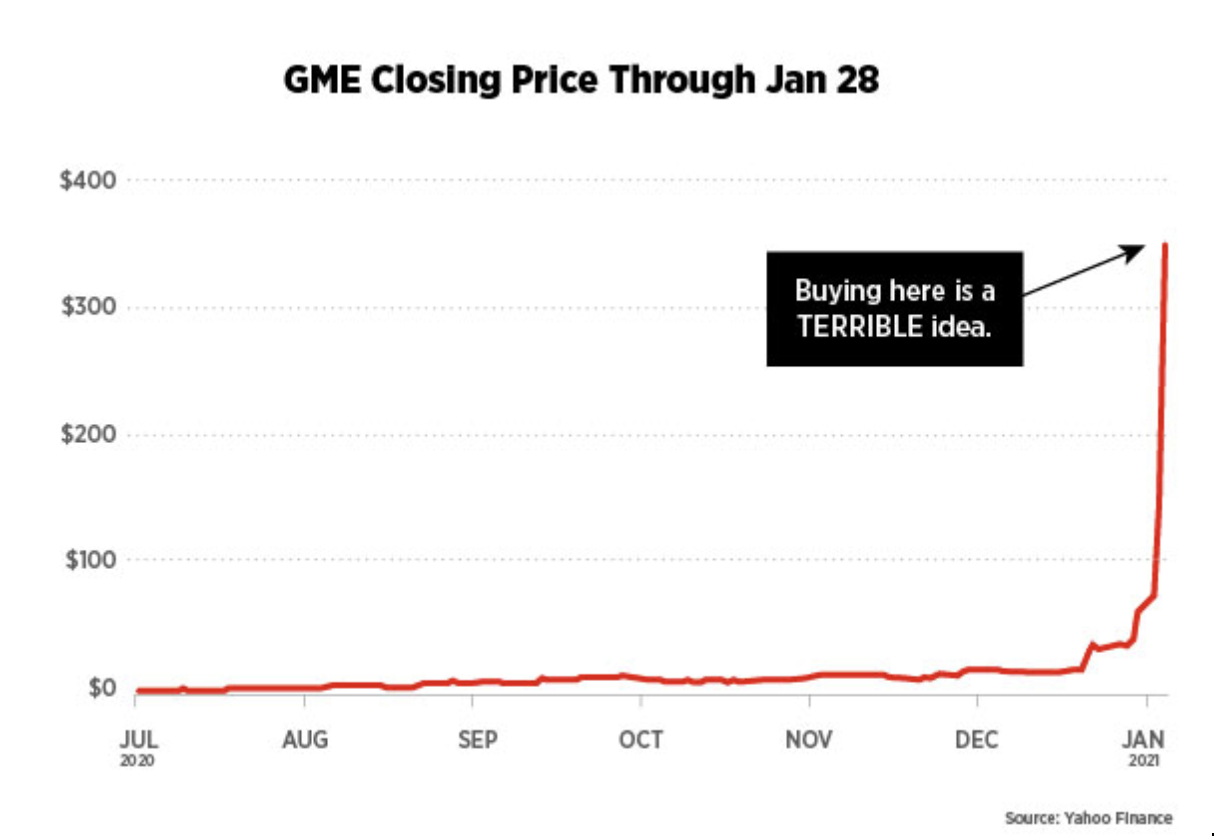WHAT IS GAMESTOP AND WHY DOES EVERYONE CARE?
Long Read Ahead (It’s a little complicated)
WHAT IS GAMESTOP?
GameStop is a brick-and-mortar video game chain that hit hard times in the pandemic. Like many distressed companies, it was targeted by short sellers betting that the stock’s price would go down.
WHAT IS SHORT SELLING?
Basically, short sellers do the opposite of most investors. They try to make money when a stock’s price falls. They borrow shares from their brokerage for a fee, immediately sell them, and plan to buy them back later at a lower price when the price falls. Shorting is a strategy used by certain types of hedge funds.
WHAT IS A SHORT SQUEEZE?
Shorting stocks is risky since any positive news or interest in a company can drive the stock’s price up. When short sellers bet wrong and a stock’s price rises, they can be forced to buy shares at higher prices to cover their losses (or pony up more collateral).
A squeeze happens when short sellers scramble to buy shares to cover their positions when the stock price is rising. The more investors who buy and hold those shares, the harder it is for short sellers to find shares to buy (exposing them to potentially huge losses).
“WITH ME SO FAR?”
WHERE DOES REDDIT COME IN?
After it became clear that short sellers were betting on GameStop’s demise, the popular company became the focus of amateur traders on the popular WallStreetBets forum on Reddit, a popular community of chatrooms and forums.
By banding together and coordinating buying activity, these small-time traders boosted the stock’s price far above what the company’s financial fundamentals support, putting pressure on the hedge funds betting the other way.
The stock went viral!
WHY?
“Social media chatter +
free trading apps like Robinhood +
bull market +
new investors with time on their hands
= FRENZY”
Is it illegal? That’s a stretch. These armchair traders are egging each other into speculative bets, but I don’t think it rises to the level of illegal market manipulation. However, regulators might feel differently.
Is it bad for markets? The battle between gleeful amateurs pushing prices up and hedge funds scrambling to force prices down has led to some of the highest volume trading days on record and cost short sellers billions.
IS THIS DAVID VS GOLIATH?
I don’t think the GameStop bubble is just about greed or boredom or euphoria. I see a powerful narrative at play.
I think a lot of these small traders are angry at the perception that All-Powerful Wall Street is pulling strings and using their connections to hurt mom-and-pop investors. They see this as an opportunity to stick it to the big-money pros by using their own strategies against them.
It’s new school vs. old school. Rebels vs. the Empire. Bueller vs. Principal Rooney. Reddit vs. CNBC.
SO, SHOULD I BE INVESTING IN GAMESTOP?
GameStop’s stock is massively inflated and trading has been halted multiple times because of its meteoric rise. At this point, it looks like folks are piling in just to say they were there.
GameStop Stock
When the bubble bursts, it’ll be a rush to sell and many GameStop holders will end up losing most of their investment.
“(It might already be happening
by the time you read this.)”
We’ve seen frenzies like this many times before. Tulip mania in the 1630s, the Nifty Fifty in the 1970s, the dot-coms in the 1990s, Bitcoin’s multiple bubbles over the last decade, etc. We’ll see more in the future.
WHY ARE PEOPLE ANGRY AT ROBINHOOD?
Amidst the buying frenzy, Robinhood and other popular brokerage platforms suddenly restricted trading on several red-hot stocks, including GameStop.
Protests erupted from investors, many market pros (not the short sellers, obviously), lawmakers and more.
Did Robinhood halt trading to appease big investors at the expense of small investors? Did they do it to protect markets from manipulation and liquidity problems?
I dislike the idea that a broker can just shut down trading in a security. I think it opens the door to situations where platforms prioritize one investor over another and that’s a massive conflict of interest.
I’m frustrated on behalf of everyone else affected by brokerage outages and difficulty trading.
But frankly, it’s pretty wild that a bunch of regular folks with small trading accounts can bring massive institutional investors to their knees.
WHAT ARE THE IMPLICATIONS OF THIS FRENZY?
There’s no predicting the future, obviously, but I think a few things are likely. Most bubbles end naturally when the euphoria turns to panic, folks start selling, and the price crashes.
However, it’s also possible that regulators will step in if they think there’s risk to markets (or they see too many investors getting hurt).
I think this ride’s going to end in tears for many folks caught up in it. But I’m not sure who will be crying hardest.
“I think markets could see some wild swings and pull back from their frothy highs, but I don’t see major risk yet.”
But, I think we’ll be left with some pressing questions once the dust settles.
Will social media traders continue to drive big market moves?
Do platforms have the right to arbitrarily decide customers can’t trade?
Are coordinated moves by small investors a danger to markets?
Should regulators be watching hedge funds more closely?
This is an evolving situation so I’m keeping a close eye on markets to see what might happen next.
Questions? Thoughts? Contact Us. If you’re curious about Investor Recovery, check out this free guide.
No more meme stonks, please.




